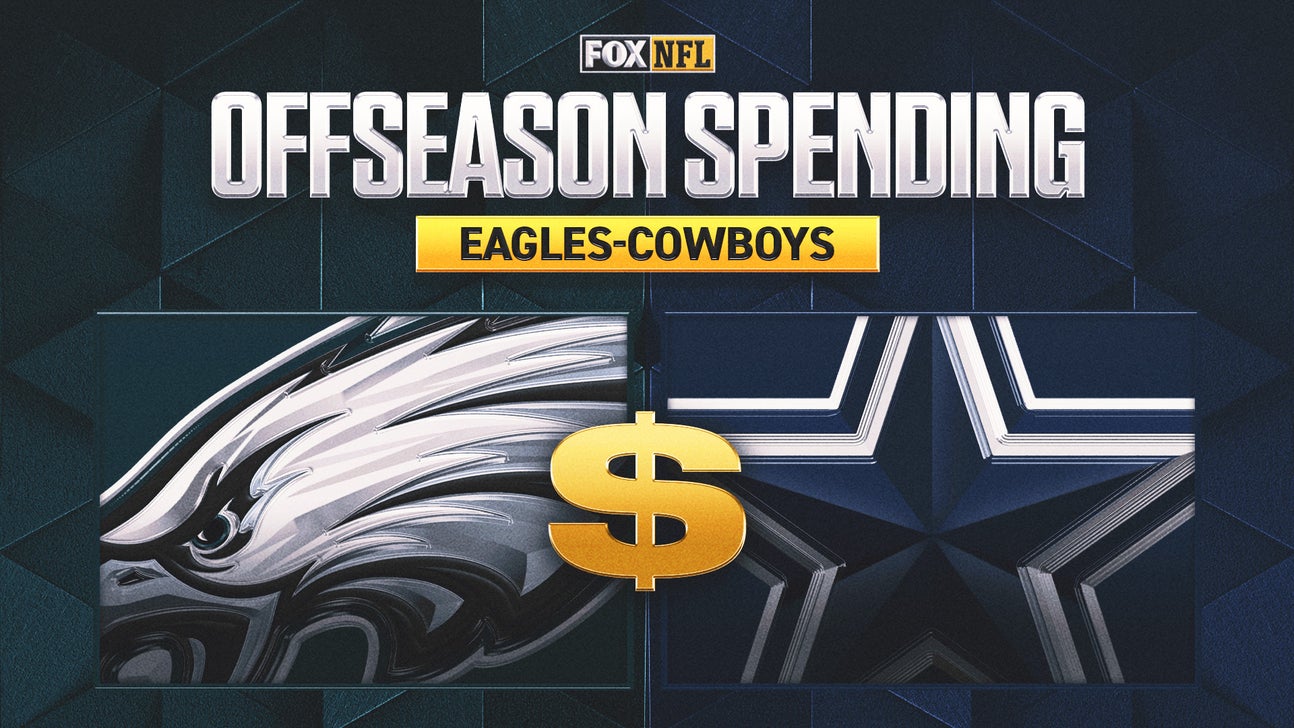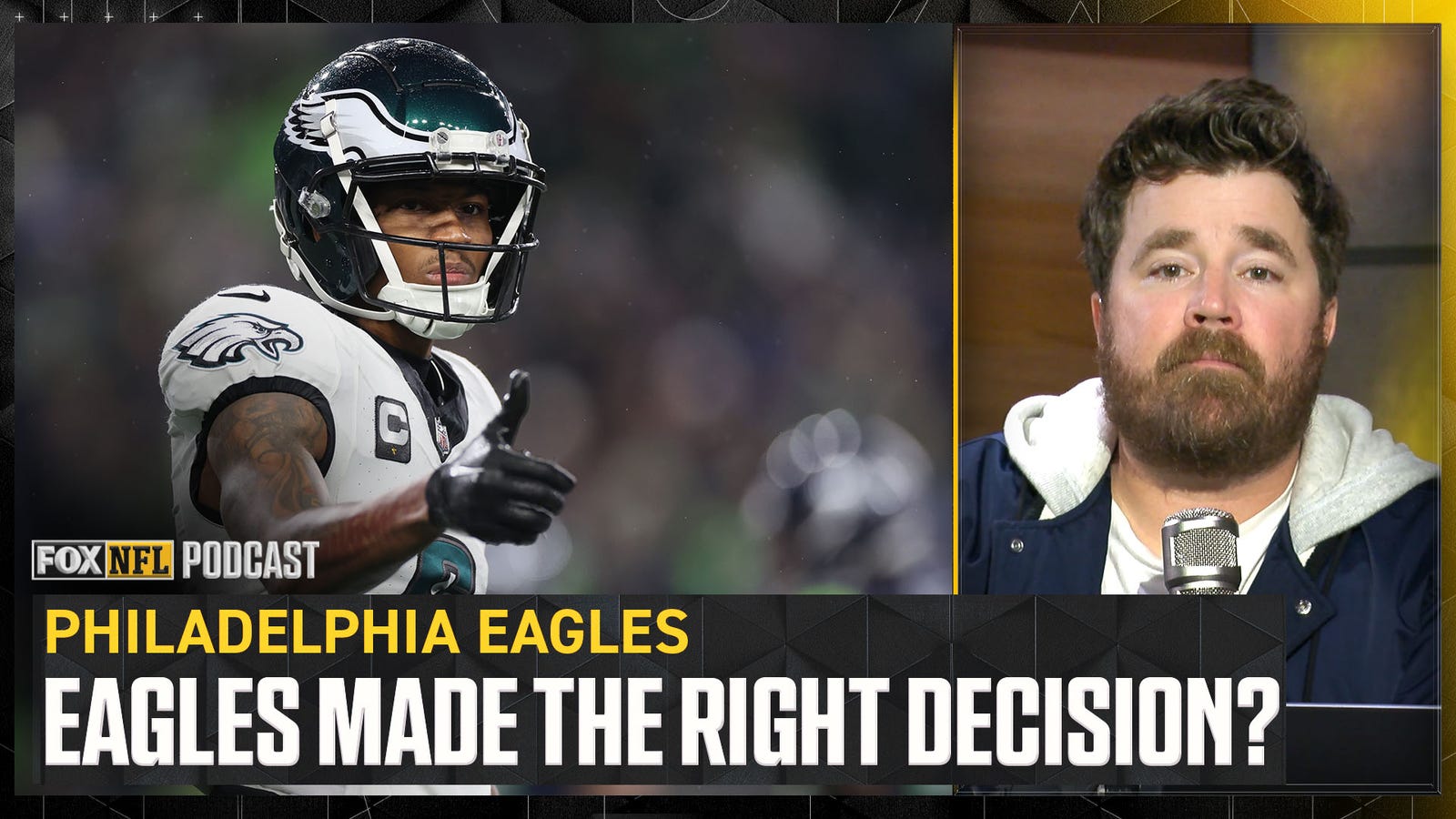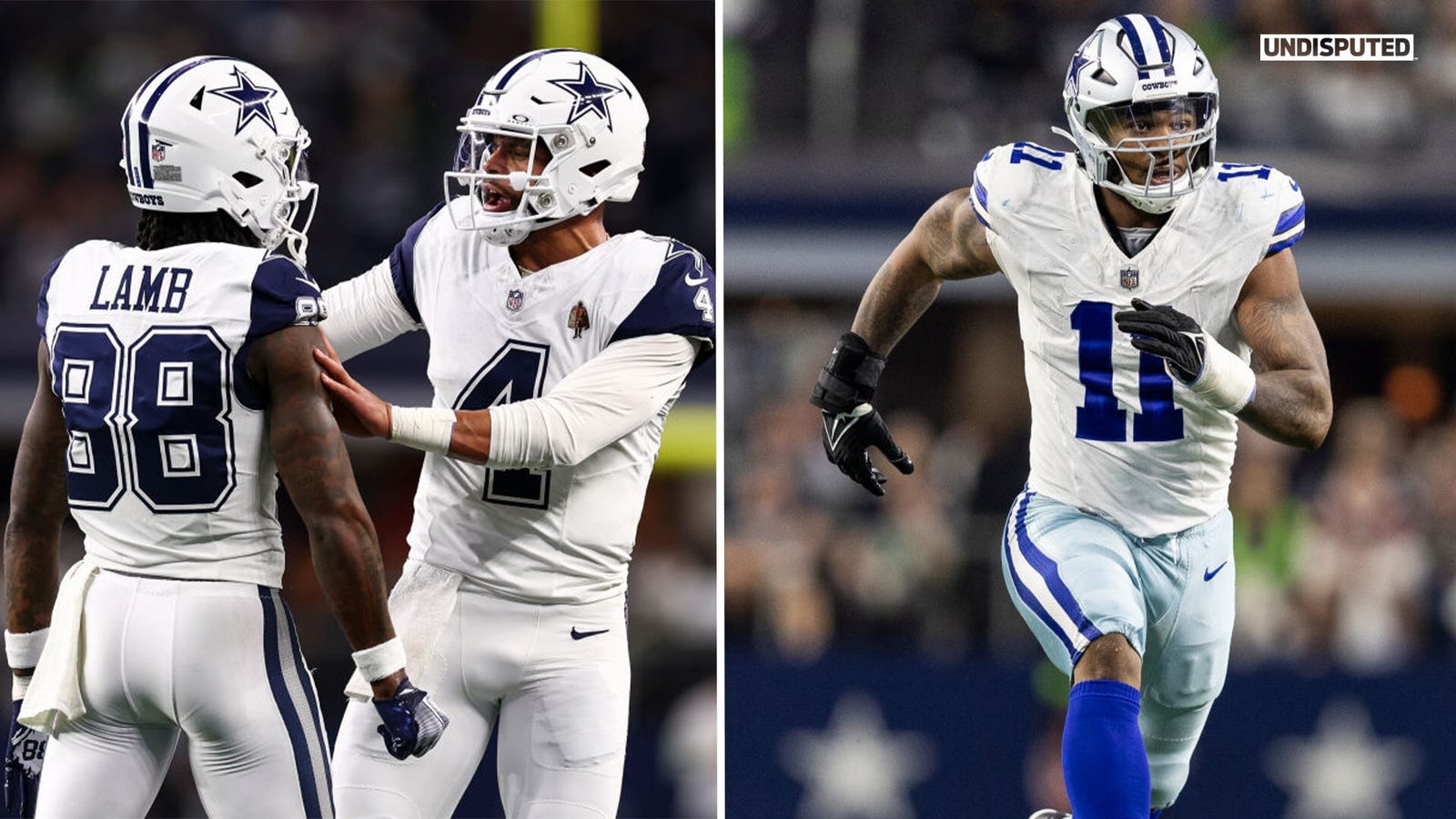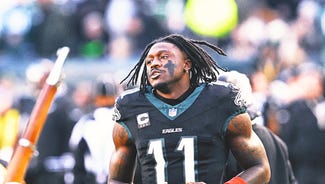
Eagles keep showing the Cowboys what 'all in' really means
Another Philadelphia Eagles player stepped to the podium on Tuesday with a smile as wide as his bank account. This time it was receiver DeVonta Smith, still two years away from a shot at the free-agent market, talking about a new deal that will keep him in Philadelphia for the next five years.
He followed left tackle Jordan Mailata and left guard Landon Dickerson after their big contract extensions earlier this offseason. And he followed running back Saquon Barkley, edge rusher Bryce Huff and safety C.J. Gardner-Johnson after they were lured to Philly with big-money deals. It feels like every week there's another press conference at the NovaCare Complex in Philadelphia — a seemingly endless parade of players committing to the Eagles while getting filthy rich.
They are clearly sparing no expense in their pursuit of another Super Bowl championship.
But weren't the Dallas Cowboys the ones who were supposed to be "all in"?
The contrast between the two NFC East rivals couldn't be more stark. The Eagles have been one of the NFL's most aggressive teams this offseason, setting themselves up to contend for several more years. Meanwhile, the Cowboys have sat mostly still as they lost their starting left tackle, starting center and starting running back. They keep saying they're "all in" — as Jerry Jones first said back in January — while doing nothing to convince anyone that they're "in" at all.
"Everybody has their own definition of what that means," Cowboys VP Stephen Jones said in an interview on 105.3 The Fan in Dallas on Tuesday. "But I've never not known us to be all in, nor have I known anyone we compete against not to be all in."
Jones' point was that the Cowboys are not exactly cheap, that they "spend max, max money year in and year out." He also pointed to their already-stacked roster, which was good enough to win the division with a 12-5 record last season. And he indicated they weren't active in free agency because they're saving their money and salary cap space as they're "looking towards signing our own guys."
But that is exactly where the paths of the NFC East's best two teams diverged. The Cowboys have three core players looking for contract extensions — quarterback Dak Prescott, receiver CeeDee Lamb and linebacker Micah Parsons. Prescott and Lamb, in fact, are entering the final year of their deals, which use up $73.1 million in salary cap space — a whopping 28.6 percent of the Cowboys' cap for 2024.
Did the Eagles make the right decision by extending DeVonta Smith?
Yet the Cowboys have not re-signed any of them. The cost would obviously have been high. There's no doubt that all three players want to be among the highest-paid at their positions. But even if the Cowboys had granted their wish, those mega-extensions would have almost certainly lowered their cap hits in 2024 — especially for Prescott (whose cap number is a ridiculous $55.1 million) and Lamb ($17.9 million).
That savings could have allowed them to keep center Tyler Biadasz (who signed with the Washington Commanders), left tackle Tyron Smith (New York Jets), running back Tony Pollard (Tennessee Titans) or edge rusher Dorance Armstrong (Commanders). Or at least the extra cap space would have allowed them to replace the players they lost.
"What the Eagles are doing with the salary cap is not magic," said one NFL executive. "They're better than anyone at locking up their key players early. It looks expensive at first, but it almost always leads to financial flexibility later. They end up having less holes to fill and more money to fill them with.
"When you don't do that, you're stuck with the bloated back ends of contracts. That's where the Cowboys are with Dak and with Lamb. I'm really surprised they didn't fix that before free agency started."
Meanwhile, the Eagles got to work on their financial flexibility a year early, when they signed quarterback Jalen Hurts to his enormous, five-year, $255 million contract last year. That deal carries only a $13.5 million cap hit this season — $41.6 million less than Prescott is costing the Cowboys. They also gave right tackle Lane Johnson a one-year, $33.5 million extension through 2026, which with void years spread out his cap hits over the next five years.
That gave them the flexibility to re-sign Dickerson (four years, $84 million) and kicker Jake Elliott (four years, $24 million) before free agency started in March. And that gave them room to sign Barkley (three years, $37.75 million), Huff (three years, $51.1 million), Gardner-Johnson (three years, $27 million) and others. And they still had room to sign extensions with Mailata (three years, $66 million) and Smith (three years, $75 million) and give defensive end Josh Sweat more guaranteed money this year.
"When you're able to do that and be in position to lock down the caliber of players that we think we've locked down, it really gives you flexibility as you build your team going forward," Eagles general manager Howie Roseman said. "It's a great success story for us to be able to draft guys and sign them to extensions. I think it's a great message to our team that if you come here and do the right thing you don't have to leave."
It helps that the Eagles aren't being cheap, either. The average of Mailata's extension makes him the fourth highest-paid left tackle in the NFL. Dickerson is the highest-paid guard in NFL history. Barkley's deal ranks fourth among running backs. Smith's extension ranks fourth among receivers, tying him with fellow Eagles receiver A.J. Brown. Even Elliott is the highest-paid kicker in the league.
"Players all know which teams take care of their own," said one prominent NFL agent. "It makes the Eagles much more appealing. It's why so many of them are willing to pass on their shot at free agency by signing early. They want to stay."
Cowboys face contract mess with Dak Prescott, CeeDee Lamb, Micah Parsons
There are risks in that approach, of course. The money and cap space is not unlimited, which is why the Eagles traded Haason Reddick — one of the NFL's best pass rushers with 50 1/2 sacks over the last four seasons — to the Jets, rather than give him a big contract extension. And while so far all of the Eagles' recent investments have seemingly been in the right players, they know that a big investment in a player who experiences a sharp decline or becomes injury prone would certainly hurt.
But it's worth the risk, according to Roseman, because it helps the "legacy" and "culture" of the Eagles, and because they trust their evaluation of their own personnel.
"We believe in the players we're doing (these contracts) with," he said. "And we're hopeful it will allow us to continue to add to our team."
The Cowboys are hopeful too. They hope that by not adding to their team this offseason they can still somehow stay in contention for the Super Bowl they've been chasing for the last 28 years.
They have their reasons for their inaction that they insist go beyond their limited salary cap space. Stephen Jones, in his radio interview, said they let Tyron Smith — a second-team All-Pro last season — go to the Jets (for just two years, $6.5 million) in part because the 33-year-old "had to miss a lot of games" the last few years with injuries. As for Biadasz, who got a three-year, $30 million deal to go to Washington, Jones said "at some point there, you've got to make a tough decision that we can have him go to another team and we can replace him, hopefully, and have a center who's better."
Of course, they haven't replaced him yet. Nor have they replaced Smith or Pollard. And with free agency having mostly thinned out in the month the market has been open, there's not much left for the Cowboys in their search for help beyond the NFL Draft.
"I certainly understand where people are going to measure whether you lose somebody or you replace them or don't replace them right then and there," Jones said. "We understand that. (But) we certainly feel good about the direction we're headed. We like our roster. We like our football team."
In other words, they're "all in" on the team they already have — which wasn't exactly what everyone thought Jerry Jones meant when he set the tone for the offseason by using those words. The Eagles never gave that kind of bold proclamation.
They just went "all in" with their actions instead.
Ralph Vacchiano is the NFC East reporter for FOX Sports, covering the Washington Commanders, Philadelphia Eagles and New York Giants. He spent the previous six years covering the Giants and Jets for SNY TV in New York, and before that, 16 years covering the Giants and the NFL for the New York Daily News. Follow him Twitter at @RalphVacchiano.












